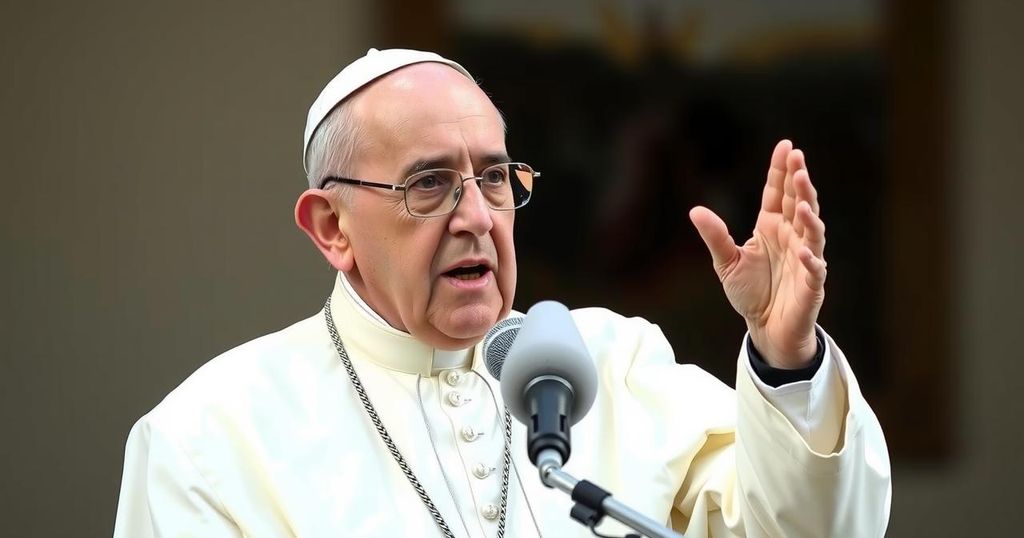Pope Francis visited Papua New Guinea, advocating for equitable distribution of the country’s natural resources, which are currently benefiting only a fraction of the population. He addressed the high levels of poverty that persist despite significant economic gains, called for better consideration of local needs in resource management, and urged an end to ongoing tribal violence that hampers development.
On Saturday, Pope Francis visited Papua New Guinea, delivering a poignant message regarding the exploitation of the nation’s abundant natural resources. During his meeting with political and business leaders, he emphasized that the wealth generated from these resources must also benefit the broader community, rather than remaining in the hands of a select few. The pontiff highlighted the existence of substantial gold, copper, nickel, gas, and timber reserves, while also pointing out that more than a quarter of the population currently lives in extreme poverty.
Pope Francis reinforced the notion that the resources should be shared among the 12 million citizens, stating, “These goods are destined by God for the entire community.” He urged that while international companies and experts may be necessary in resource extraction, it is crucial for local needs to be prioritized in the distribution of profits and job opportunities. This message is particularly relevant in a nation where poverty persists despite its wealth.
Highlighting the stark contrast between resource wealth and local suffering, the pope’s call for equitable distribution resonates not only with the people of Papua New Guinea but also with numerous populations in resource-rich regions around the globe. Young pilgrim Jonathan Kais from Manus Island expressed hope that the pope’s words would inspire the government to provide improved local services.
Despite developments such as a $19 billion liquified natural gas project operated by ExxonMobil, which has been running since 2014, many Papua New Guineans have yet to see significant benefits. A recent World Bank study indicated that between 2009 and 2018, economic growth in the country did not translate into a meaningful reduction in poverty, stating, “Poverty hardly changed over that time.”
In addition to addressing economic inequality, the pope also appealed for an end to the ongoing tribal violence that has devastated communities in Papua New Guinea. He lamented the high toll of violence on local populations, exacerbated by an influx of firearms and mercenaries, and called for peace and stability for development to flourish. The violence, he stated, is not merely a remnant of ancient traditions but is closely linked to modern issues such as a rising population and economic instability, which have contributed to a cycle of conflict and suffering.
The challenging socioeconomic landscape of Papua New Guinea is shaped by its rich natural resources, which contrast sharply with the poverty experienced by a significant portion of its population. Despite the substantial revenues generated from mining operations, many citizens feel left behind and deprived of the benefits. The recent visit from Pope Francis underscores the urgent need to address these disparities and to promote policies that ensure equitable wealth distribution among the local populace. Furthermore, ongoing tribal violence exacerbates these issues, complicating efforts to foster stability and improve living standards in the country.
Pope Francis’ visit to Papua New Guinea highlights the pressing need for the fair distribution of the country’s natural resources to benefit all citizens, particularly in light of the persistent poverty experienced by many. His messages resonate powerfully with local communities, emphasizing the imperative for governments and corporations to consider the marginalized in their plans. Additionally, the pope’s call for an end to tribal violence reflects a critical aspect of advancing peace and development in the region, which is hampered by ongoing conflicts fueled by modern challenges rather than traditional customs.
Original Source: www.voanews.com






